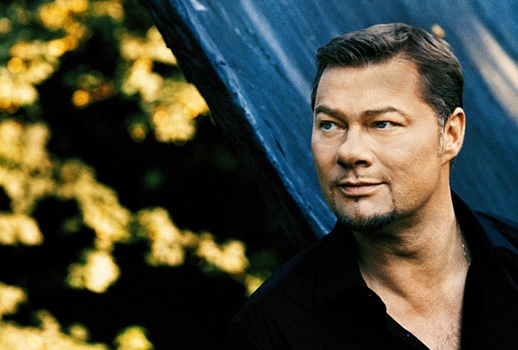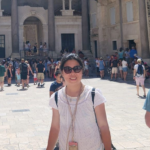
People declared him to be the next great Wotan or Hans Sachs—he’s 50 and those roles never happened. Most opera singers rely on a series of scarves, hand sanitizers, humidifiers, and herbal teas to keep their voices in pristine conditio. Pape is rarely seen without his trademark cigarette dangling out of his mouth. And while many singers seem content to spend all their time on various social media platforms, happily fishing for praise, Pape maintains an aloof, unapproachable public image.
But like Don Draper, he’s so very, very cool. His recital in the cavernous Metropolitan auditorium this afternoon was proof of his ultra-coolness: what other singer can get away with a sunny, cheerful program consisting of Beethoven’s Six Songs After Poetry by Gellert, Antonín Dvorak’s Biblical Songs, Roger Quilter’s Three Shakespeare Songs, and Mussorgsky’s Songs and Dances of Death? There’s a lot of death and despair in those songs, and Pape didn’t alleviate the gloom and doom with any smiles to the audience, any cute Caballé winks and giggles, any warm waves.
In fact, when a small group started clapping between songs, he gave them the death glare. Only in the final encore, when he sang Lerner and Loewe’s “If Ever You Would Leave Me,” did the mood in the auditorium brighten. Pianist Camillo Radicke was excellent—he never faded into the background. His playing highlighted all the occasionally idiosyncratic rhythms and harmonies of these songs.
The opener of Beethoven songs just confirmed my long-held belief that Beethoven used voices as occasional accompanists for instruments. Pape’s voice is pretty overpowering but it couldn’t overpower Beethoven’s piano “accompaniment.” During “Busslied” I lost track of the vocal line entirely and just listened to the mini-piano sonata that Beethoven composed in the “background.”
The Biblical Songs was the complete opposite—the piano was completely subservient to the voice. These 10 songs start out extremely somber, even stark, but gradually become more fervent, like a religious revival. Through it all, you can hear Dvorak’s folk-inflected melodic genius. I don’t understand Czech but I did follow along with the score and thought Pape’s Czech sounded well-enunciated.
The Shakespeare Songs showed Pape’s excellent English diction—all the vowels are there. The only consonants he had trouble with was the “th” sound that came out more like a hard “d.” In the second song “O mistress mine” the line “Youth’s a stuff will not endure” sounded more like “Yood’s a stuff will not endure.” Quilter’s brief song cycle was melodically simpler than Beethoven, Dvorak, and Mussorgsky, but I kind of liked their jaunty sing-songness.
The Mussorgsky’s is one of the most well-known song cycles ever composed. Mussorgsky’s four depictions of Death are very like Emily Dickinson or Sylvia Plath—morbid and vivid impersonations. In “Lullaby” a mother’s gentle song becomes more and more desperate as death grips her infant. Then the song becomes chillingly quiet as death takes over the infant. The most haunting melody is the repeated line “Hush baby, hush baby mine” (Bayushki, bayu, bayu.) In “Serenade” death acts as a lover, and ends with the chilling line “Be still … you are mine!” In “Trepak” Death is depicted as a charming folk dance, and the final song “The Field Marshal” sounds almost like a rousing military song as death takes on the form of a military commander.
I thought Mussorgsky’s song cycle was the only misfire in Pape’s programming. Maybe it’s because they’re the only songs I’m familiar with, but Pape’s approach did seem impersonal and homogenized. Pape’s voice suits the religious, formal tone of Beethoven and Dvorak’s song cycles, but not so much the unique, idiosyncratic, voice of Mussorgsky. I’ve heard basses with half Pape’s voice impersonate the various death guises to more effect. Here, for example, is Evgeny Nesterenko:
Nesterenko’s voice doesn’t have Pape’s smooth sonorous tone. It’s hard-edged and tough on the ears. But he sounds like death, whereas René Pape sounded like René Pape. It’s beautiful, but the approach is like all those Rimsky-Korsakov orchestrations that tried to make Boris Godunov “beautiful.”Then again part of René Pape’s appeal is that he doesn’t wear his heart on his sleeve, that he doesn’t “inhabit” roles the way a Method actor would, and he doesn’t try to get the audience to “like” him. Audiences love the sound of his voice, and that’s his God-given gift. As I said, only in the final encore did he drop his Don Draper-like cool. “If Ever I Would Leave You” was exactly the kind of syrupy tune audiences long for as encores, and he sounded so glorious I talked to my companion about my wish to hear him sing “Some Enchanted Evening.” But in true René Pape style, after that gorgeous Camelot cameo he swept offstage without so much as a backward glance, probably to smoke a cigarette and have a vodka on rocks. Mingling is for the mortals.



